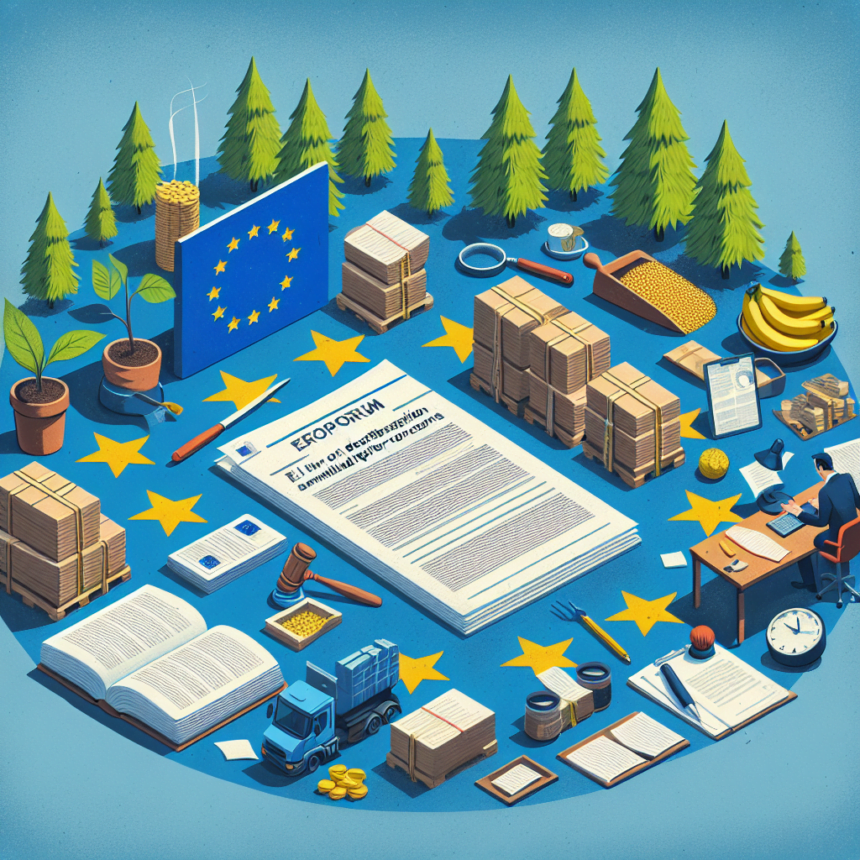Main Points In Hindi (मुख्य बातें – हिंदी में)
-
ईयू का ठोस रुख: यूरोपीय संघ ने प्रमुख कृषि-निर्यातक देशों की आपत्तियों के बावजूद अपने वनों की कटाई विनियमन (ईयूडीआर) को लागू करने में देरी नहीं करने का निर्णय लिया है, जिसका कार्यान्वयन 30 दिसंबर को शुरू होगा।
-
व्यापार प्रभावित: यह विनियमन विभिन्न उत्पादों जैसे मवेशी, सोयाबीन, पाम तेल और चॉकलेट पर असर डालता है। निर्यातकों को यह सुनिश्चित करना होगा कि ये सामान वनों की कटाई न की गई भूमि से प्राप्त किए जाएं।
-
संकट और अनुपालन अवधि: बड़ी कंपनियों के लिए अनुपालन की अवधि 18 महीने है, जबकि छोटी कंपनियों को 24 महीने का समय दिया गया है। बड़ी कंपनियों को दिसंबर 2024 तक और छोटी कंपनियों को जून 2025 तक नियमों का पालन करना होगा।
-
कानूनी चुनौतियाँ: यूरोपीय कोको एसोसिएशन ने ईयूडीआर के कार्यान्वयन में देरी की मांग की है, यह सुझाव देते हुए कि कानूनी दृष्टिकोण और नियमों की व्याख्या पर स्पष्टता की कमी ने तैयारी को जटिल बना दिया है।
- ग्लोबल ट्रेड रिसर्च इनिशिएटिव की आपत्तियाँ: जीटीआरआई ने ईयूडीआर की आलोचना की है, इसे व्यापार बाधा के रूप में बताते हुए कहा है कि यह निर्यात को बढ़ावा देने और ईयू के कृषि क्षेत्र की रक्षा करना चाहता है।
Main Points In English(मुख्य बातें – अंग्रेज़ी में)
Here are the main points regarding the European Union’s (EU) stance on the EU Deforestation Regulation (EUDR):
-
No Delay in Implementation: The EU has affirmed that it will not postpone the implementation of the Deforestation Regulation, which is set to take effect on December 30, despite objections from major agricultural exporters such as Brazil, India, Indonesia, and the United States.
-
Compliance Requirements: Under the regulation, exporters must ensure that certain goods, including beef, chocolate, and palm oil, are sourced from lands that have not experienced deforestation after December 31, 2020. Large firms have an 18-month compliance period, while smaller firms have 24 months to meet these requirements.
-
Concerns Over Regulatory Clarity: The European Cocoa Association (ECA) and others have expressed concerns about the lack of clarity and delayed guidance regarding the regulation. They argue this uncertainty may hinder compliance and competitiveness within the agricultural sector.
-
Trade Barrier Accusations: The Global Trade Research Initiative (GTRI) has criticized the EUDR, claiming it serves as a trade barrier under the guise of environmental protection, while prioritizing the EU’s agricultural interests.
- Concerns About Monitoring Systems: There are significant worries about the design and capabilities of the monitoring information system associated with the EUDR, which is expected to manage vast amounts of agricultural data related to compliance with the new regulations.


Complete News In Hindi(पूरी खबर – हिंदी में)
यूरोपीय संघ (ईयू) ने प्रमुख कृषि-निर्यातक देशों की आपत्तियों के बावजूद अपने वनों की कटाई विनियमन (ईयूडीआर) को स्थगित करने के अपने निर्णय को बनाए रखा है। यह विनियमन 30 दिसंबर से प्रभावी होगा, और इससे ब्राज़ील, भारत, इंडोनेशिया और अमेरिका जैसे देशों की चिंताएँ बढ़ गई हैं। ईयू ने विश्व व्यापार संगठन (डब्ल्यूटीओ) को सूचित किया कि वह इस नियोजन को लागू करने में कोई देरी नहीं करेगा।
यूरोपीय संघ का तर्क है कि यदि विनियमन को स्थगित किया गया, तो इसके लिए नई विधायी प्रक्रियाएँ अपनानी पड़ेंगी, जिससे कानूनी निश्चितता से वंचित होना पड़ेगा। दूसरी ओर, ग्लोबल ट्रेड रिसर्च इनिशिएटिव (जीटीआरआई) ने इस विनियमन की आलोचना की है, यह दावा करते हुए कि यह निर्यात को बढ़ावा देने और ईयू के कृषि क्षेत्र की रक्षा को प्राथमिकता देता है। जीटीआरआई का तर्क है कि यह विनियमन पर्यावरणीय उपाय के नाम पर व्यापार में बाधाएँ उत्पन्न करता है।
ईयूडीआर का कर्ता विभिन्न उत्पादों जैसे मवेशी, भैंस, गोजातीय मांस, सोयाबीन, पाम तेल, कोको बीन्स, चॉकलेट, कॉफी आदि को प्रभावित करता है। निर्यातकों को यह सुनिश्चित करना होगा कि ये उत्पाद 31 दिसंबर 2020 के बाद वनों की कटाई न की गई भूमि से प्राप्त किए गए हों। बड़ी फर्मों के लिए 18 महीने की अनुपालन अवधि है, जबकि छोटी फर्मों के पास 24 महीने हैं, जिसका अर्थ है कि बड़ी कंपनियों को दिसंबर 2024 तक और छोटी कंपनियों को जून 2025 तक निर्धारित मानकों का पालन करना होगा।
यूरोपीय कोको एसोसिएशन (ईसीए) भी इस मुद्दे पर अपनी आवाज उठाते हुए चाहता है कि ईयूडीआर के नियमों के कार्यान्वयन में देरी की जाए। इसने यूरोपीय आयोग की अध्यक्ष उर्सुला वॉन डेर लेयेन को एक पत्र लिखा, जिसमें कहा गया कि क्षेत्र को जलवायु तटस्थता के लक्ष्यों में पिछड़ने का जोखिम नहीं उठाना चाहिए, लेकिन कानून में उपस्थित चिंताओं पर भी ध्यान देना आवश्यक है। ईसीए ने कहा कि प्रमुख तत्वों की अस्पष्टता ने कानूनी दृष्टिकोण से तैयारी को कठिन बना दिया है।
इस संगठन ने ईयूडीआर से जुड़े निगरानी सूचना प्रणाली पर भी गंभीर चिंता व्यक्त की, जिसमें कहा गया कि जानकारी के सही ढंग से प्रबंधन में उचित संरचना और क्षमता की कमी है।


इन सभी पहलुओं के साथ, यह साफ है कि ईयू और अन्य देशों के बीच व्यापार बाधाओं और चिंताओं का एक जटिल जाल बन रहा है, जो वैश्विक कृषि और व्यापार संतुलन पर महत्वपूर्ण प्रभाव डाल सकता है।
Complete News In English(पूरी खबर – अंग्रेज़ी में)
The European Union (EU) has reiterated its stance against postponing the EU Deforestation Regulation (EUDR) despite objections from major agricultural exporting countries such as Brazil, India, Indonesia, and the United States. The EU has informed members of the World Trade Organization (WTO) that it will not delay the implementation of this regulation, which is set to take effect on December 30, 2023.
During a recent meeting of the agriculture committee, the EU argued that delaying implementation would require legislative changes and would not provide immediate legal certainty for operators. Nevertheless, the Global Trade Research Initiative (GTRI) criticized the EUDR, suggesting that it prioritizes the protection of the EU’s agricultural sector while promoting exports. GTRI contends that the regulation acts as a trade barrier under the guise of environmental measures.
The EUDR affects a range of products, including cattle, buffalo, beef preparations, oil cake, soybeans, palm oil, cocoa beans, chocolate, coffee, leather hides, paperboard, wooden products, and furniture. Exporters are now required to ensure that these goods are sourced from land that has not been deforested after December 31, 2020. Larger companies have an 18-month compliance period, while smaller firms have 24 months, meaning large companies must comply by December 2024 and small companies by June 2025.
The European Cocoa Association (ECA) has joined the growing call for a delay in the implementation of the EUDR regulations concerning deforestation in supply chains. In an open letter to European Commission President Ursula von der Leyen, the organization emphasized that the sector cannot afford to “fall behind” or lose its competitive edge in its work towards climate neutrality, while also raising significant concerns about the law’s implementation.
This call follows German Chancellor Olaf Scholz’s similar request for the EU Commission leaders to agree to delay the planned implementation by the end of December. The ECA noted a lack of clarity on key aspects due to the repeated delays in publishing guidance and FAQs, creating significant uncertainty regarding the legal preparedness for the regulation.
Moreover, the organization expressed “extreme concern” regarding the monitoring information system associated with the EUDR program, citing worries about its design, implementation, and capabilities to adequately process millions of agricultural data records. The lack of clarity on how the law will be interpreted has further complicated matters, leading to calls for an extension of the implementation timeline.
The EU’s firm position amidst the pushback highlights the ongoing tension between environmental regulations and trade practices as countries strive to balance agricultural interests with climate change initiatives. The next steps involve continued discussions within the EU and with stakeholders to address these emerging concerns while moving forward with the regulation’s implementation.
Source link








